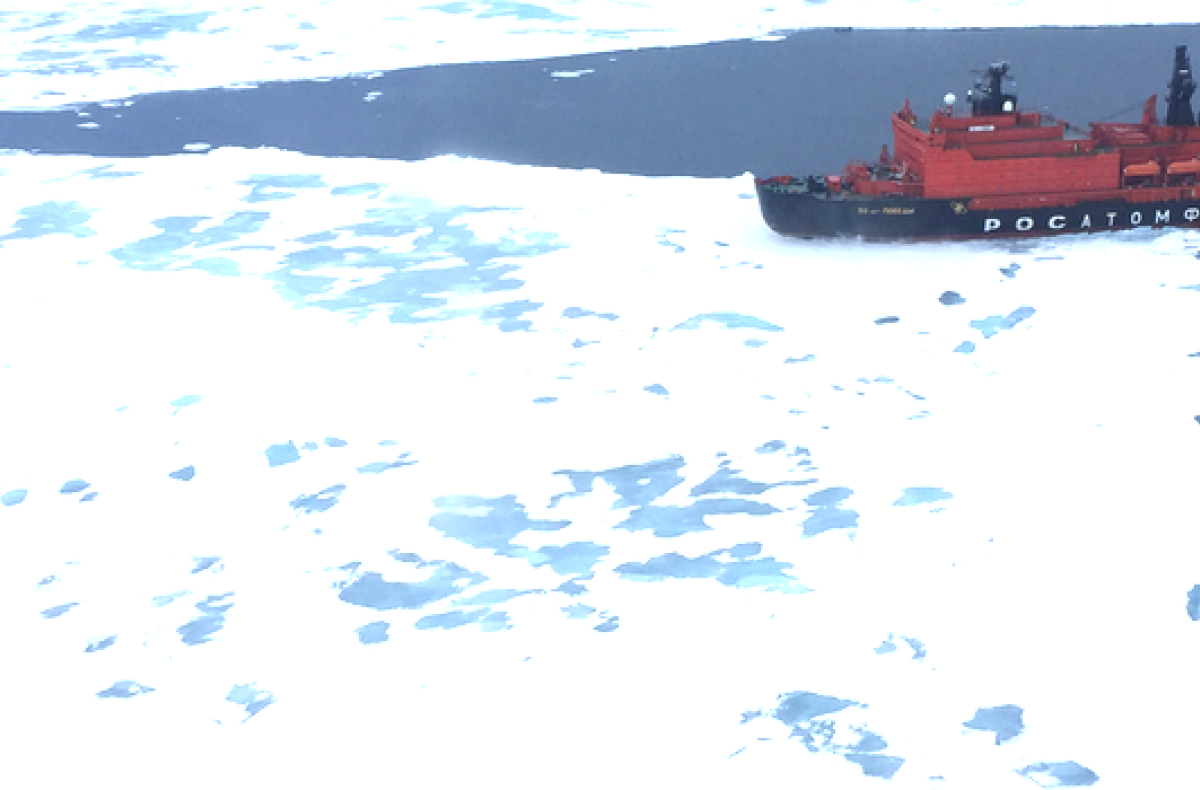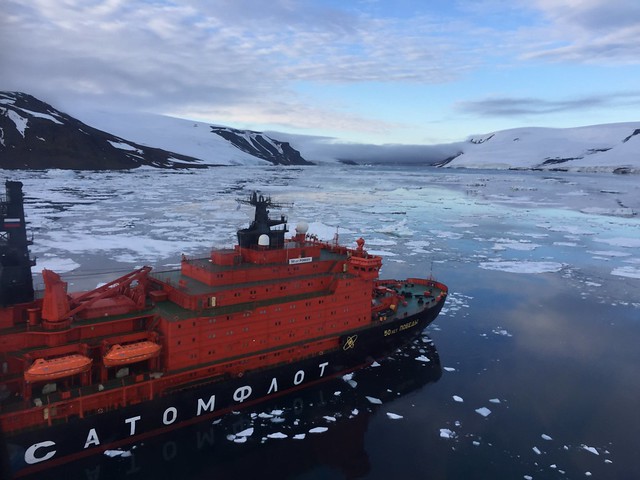The Woods Institute is now part of the Stanford Doerr School of Sustainability
Arctic Perspectives

A Russian nuclear-powered icebreaker ship in the Arctic.
Courtesy of Fran Ulmer
Mar 21, 2018
By:
As Lieutenant Governor of Alaska from 1994 to 2002, Fran Ulmer was the first female elected to statewide office there. It was one of many pioneering roles for a policymaker unafraid to explore new territory in search of solutions. Among other positions since then, Ulmer has served as chancellor of the University of Alaska Anchorage, a special advisor on arctic science and policy in the Obama administration and, most recently, chair of the U.S. Arctic Research Commission.
Ulmer, the Cox Visiting Professor at Stanford’s School of Earth, Energy & Environmental Sciences and the Stanford Woods Institute for the Environment, spoke recently about the Arctic and its under-appreciated connections to the lives of people around the world.
What about the Arctic makes it so important to the rest of the world?
The Arctic is kind of a refrigerator for the planet – it affects global climate. It also affects sea level rise, economic opportunity and national defense. People have this perception that the Arctic is cold, dark and far away. It’s an area that was previously inaccessible for all intents and purposes. Now, with global warming, there’s been so much rapid change. It’s like there’s a whole new ocean that was plunked on this planet. As is usually the case when there’s access to a virgin area, people think ‘How can I use this?’
How can research on Arctic ecosystems be applied elsewhere?
The Arctic is an early indicator of what can happen to other areas. A warmer ocean changes a lot – survivability of animals, ocean currents and more. This is a wake-up call about the rate of change. All backyards are connected. The way you understand what happens in yours depends on understanding others. Snow in Rome, drought in California, sea level rise in the South Pacific – they’re all tied to Arctic change.
What should people know about how changes in the Arctic are affecting global trade and geopolitics?
In the last few years, more non-Arctic countries have attended conferences discussing the opportunity to use northern shipping routes. Interest in the area has heated up because estimates about ice-free summer Arctic routes have changed from 2050 to 2025.
You have championed technological solutions in throughout your career – from transitioning the state to an electronic ballot counting system to endorsing faster broadband in remote Arctic communities. How can technology help us better understand the Arctic?
Doing research in the Arctic is very expensive because of its remote nature and extreme conditions. Underwater autonomous vehicles, drones and satellites, among other technologies, can help us get a much more comprehensive view of where change is happening and how it will impact human beings. I think we’ve just scratched the surface frankly in terms of integrating data and technological innovations.
Why did you decide to come to Stanford?
Pam Matson, the former dean of the School of Earth, Energy & Environmental Sciences, invited me to provide insights into the Arctic for faculty, staff and students. Stanford has really smart people doing great work in the Arctic, but no Arctic center, so to speak. I want to increase curiosity and understanding of a region that is dynamically changing and presents interesting questions for science. Also, the integrated effort of the Stanford Woods Institute, the Precourt Institute for Energy and other institutes here indicates an institution that wants to move beyond the traditional academic approach of stand-alone silos, and instead provide pathways for integration.
Join a Conversation With Fran Ulmer and Woods Director Chris Field on April 4 - Register here.
Contact Information
Christine H. Black
Associate Director, Communications
650.725.8240
ChristineBlack@stanford.edu
Devon Ryan
Communications Manager
650.497.0444
devonr@stanford.edu
Rob Jordan
Editor / Senior Writer
650.721.1881
rjordan@stanford.edu



